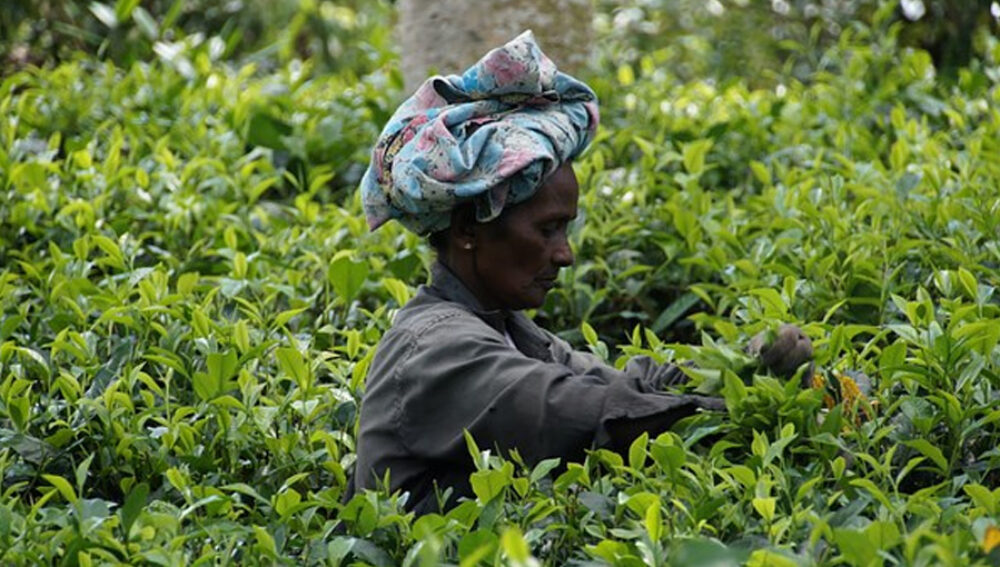
Ki-Hoon Lee and project team discuss the sustainable agricultural practices with the project facilitators in an experimental tea block in Hatton, Sri Lanka.
Agriculture plays a key role in promoting gender equality and providing opportunities for women empowerment in many of developing countries in Asia Pacific such as Sri Lanka. In Sri Lanka, the tea industry, one of the major agricultural sectors, accounts for 19 per cent of the nation’s foreign earnings and provides direct employment to over 350,000 people. The tea industry is also characterised by the involvement of a large number of smallholder farmers, who are often less-privileged women from rural areas in Sri Lanka. However, the current world market price fluctuations of tea and rising cost of agricultural inputs have rendered women tea smallholders at a great risk of losing livelihood. This phenomenon has given rise to some environmentally damaging agricultural practices that in the long-run can put the country’s entire tea industry into jeopardy.
With a view to addressing this economic, social and environmental issue, Australian National Commission for UNESCO funded a Griffith University project to promote economic, environmental and social sustainability in female tea smallholders on the less capital and resource intensive yet high productivity yielding innovative agricultural practices. This project had three specific objectives. First, to address gender equality in order to reduce gender-related income disparity by empowering female tea smallholders. Second, to enhance the inclusivity of socio-economic development process of the country by focusing on rural areas. Third, to reduce negative environmental impacts by minimising the use of synthetic materials and herbicides while enhancing the productivity of the smallholder tea farmers.

Project collaborator, Mahendra, explains the project to participants at a workshop held in a community development center in Hatton, Sri Lanka.
In phase one, training modules for capacity building were developed while in phase two the delivery of the capacity building program took place in Hatton region in Nuwara Eliya District in Sri Lanka. In a series of capacity building programs, more than 30 female tea smallholders with their family members were trained on the innovative agricultural practices that reduce the use of synthetic fertilizer and weedicides while enhancing the crop productivity of their small tea farms. After the awareness program, participants were provided with scientific knowledge and practical training on sustainable agricultural practices such as planting, weeding, pruning, plucking and maintenance. Subsequent to the capacity building program, participants were provided support to apply these sustainable agricultural practices in their own tea gardens.
The overwhelming positive feedback of the participants and their willingness to apply these practices in the future echo how the project has been successful in disseminating knowledge and practical training for the female tea holders. Since the target beneficiaries are women in the rural areas, the project also contributes to the achievement of inclusive social and economic development through women empowerment.

Project collaborator, Mahendra, receives feedback from project participants during a tea break at a workshop held in a community development center in Hatton, Sri Lanka.
This project, albeit its small scale, exhibits the potential for the achievement of the United Nations Sustainable Development Goals (SDGs) in developing countries such as Sri Lanka. Promotion of innovative and sustainable agricultural practices among female farm holders not only ensures gender equality and women empowerment (SDG 5) and responsible production patterns by minimising the use of natural resources and chemicals (SDG 12) but also improves the quality of water (SDG 6), nurtures economic growth, poverty reduction and standard of living of plantation communities (SDG 1 and 8) while protecting rivers, ecosystems and biodiversity (SDG 14 and 15). Most importantly, this project highlights the need for future large-scale projects of this nature by strengthening global partnerships to enhance international support for implementing effective and targeted capacity-building in developing countries (SDG 17).








